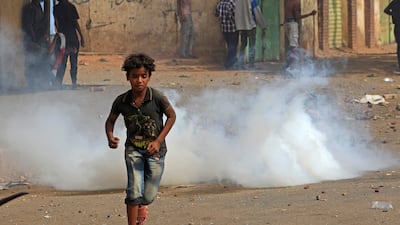Sudan's military leader Gen Abdel Fattah Al Burhan on Wednesday dismissed the five civilian members of the ruling Sovereign Council from their duties, according to a statement issued by the council.
The statement gave no reason for the surprise move, which came two days after Gen Al Burhan announced the military’s withdrawal from internationally led efforts to resolve the political crisis plaguing Sudan since a military coup last October.
Also on Monday, Gen Al Burhan urged political and revolutionary groups to start talks to form a government of “independent technocrats” to run the country during the democratic transition derailed by the October 25 coup he led.
The Sovereign Council, he said in a televised address to the nation, would be dissolved when a government is formed and a supreme council of the armed forces is created to take charge of defence and security issues.
The dialogue's facilitators - the UN, African Union and the regional IGAD group - said in a statement on Wednesday that the military's withdrawal has effectively terminated the negotiations and that they would consult with civilian stakeholders on a new formula to replace it.
The dialogue's sole session was held last month and taken up entirely by procedural matters. A boycott by virtually all opposition groups led to the indefinite postponement of the process, with the international trio saying it would have been meaningless to proceed with only the military and its supporters involved in the process.
After the removal of its five civilian members on Wednesday the Sovereign Council’s remaining eight members are made up of five generals and three leaders of rebel groups that signed a peace deal with them nearly two years ago.

The rebel leaders, since the October 2020 peace deal, have been close allies of the military, egging on the generals to seize power in the weeks before the coup.
Gen Al Burhan’s proposals have failed to persuade the opposition to halt its anti-military demonstrations, with several sit-in protests now under way in the capital Khartoum and the city of Wad Madani to the south.
The sit-ins, which have attracted hundreds, are meant to press demands for the military quit politics altogether and that those responsible for the killing of protesters ― 114 since the coup, including nine last Thursday alone ― be brought to justice.
There have also been small street rallies and street barricades of bricks, tyres or tree branches to deny security forces access to residential districts and disrupt traffic in the city.
Opposition groups are also calling for the anti-military effort to be stepped up through strikes and eventually civil disobedience to cripple the country and force the generals to step aside.

The proposals, meanwhile, have been roundly rejected by pro-democracy groups and opposition parties as an attempt to perpetuate military rule, legitimise the October coup and give the generals veto power over future governments.
The Forces of Freedom and Change (FFC), the military’s former partner in the transitional administration toppled by the October coup, called them a “giant ruse” worse than Gen Al Burhan’s power grab.
"The crisis will end with the coup leaders resigning and the forces of the revolution forming a civil government," FFC leader Taha Othman said.
“Al Burhan’s address did not return the military to the barracks. On the contrary, it placed the military above everyone else with the [proposed] supreme council of the armed forces,” Sudan’s former information minister Faisal Mohammed Saleh wrote on Wednesday on his Facebook page.
“He is not waiting for the dialogue [among civilians] to define the military’s place, its mandate and role among other state institutions. He took all that out of the process and unilaterally decided the powers of the supreme council of the armed forces,” said Mr Saleh, who served in the civilian-led government toppled by the October coup.


